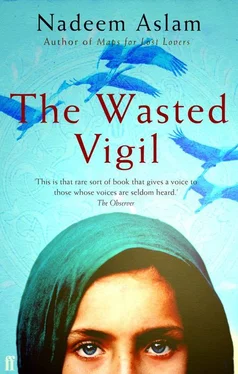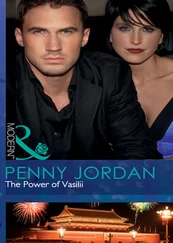Nadeem Aslam - The Wasted Vigil
Здесь есть возможность читать онлайн «Nadeem Aslam - The Wasted Vigil» весь текст электронной книги совершенно бесплатно (целиком полную версию без сокращений). В некоторых случаях можно слушать аудио, скачать через торрент в формате fb2 и присутствует краткое содержание. Год выпуска: 2009, Издательство: Faber and Faber, Жанр: Современная проза, на английском языке. Описание произведения, (предисловие) а так же отзывы посетителей доступны на портале библиотеки ЛибКат.
- Название:The Wasted Vigil
- Автор:
- Издательство:Faber and Faber
- Жанр:
- Год:2009
- ISBN:нет данных
- Рейтинг книги:4 / 5. Голосов: 1
-
Избранное:Добавить в избранное
- Отзывы:
-
Ваша оценка:
- 80
- 1
- 2
- 3
- 4
- 5
The Wasted Vigil: краткое содержание, описание и аннотация
Предлагаем к чтению аннотацию, описание, краткое содержание или предисловие (зависит от того, что написал сам автор книги «The Wasted Vigil»). Если вы не нашли необходимую информацию о книге — напишите в комментариях, мы постараемся отыскать её.
The Wasted Vigil — читать онлайн бесплатно полную книгу (весь текст) целиком
Ниже представлен текст книги, разбитый по страницам. Система сохранения места последней прочитанной страницы, позволяет с удобством читать онлайн бесплатно книгу «The Wasted Vigil», без необходимости каждый раз заново искать на чём Вы остановились. Поставьте закладку, и сможете в любой момент перейти на страницу, на которой закончили чтение.
Интервал:
Закладка:
They asked for all windows to be painted black so no one would catch a glimpse of a woman. Earning a living was declared inappropriate conduct for females, resulting in arrest for insubordination against Allah’s will. Trying to escape a Taliban beating for exposing her feet, her burka not being long enough, a young woman had in her terror run in front of an oncoming Taliban jeep. She bled to death in front of Marcus’s clinic because — being male — he was not allowed to administer to her. Women became afraid of catching even the smallest of illnesses: left untreated, it could grow and cause death — and Marcus did see a twelve-year-old die of measles.
They had banned schools for girls immediately but later they forbade them even for boys, and no one could do anything. Men walking by averted their eyes and quickened their pace if a woman was being lashed in the street — if they tried to prevent it they would be set upon. It was best to see as little as possible. Afghanistan became a land whose geology was fear instead of rock, where you breathed terror not air.
Despite this monstrous thraldom, however, Qatrina and Marcus continued to see patients of either gender in secret whenever they could.
Visiting a patient’s home one day he noticed in a corner the large wooden chest in which Qatrina had kept the ninety-nine paintings. The chest was among the many things missing from the ruined house by the lake when he returned from exile in Peshawar. On seeing it now Marcus moved towards it and opened it: the paintings were still in there, still beautiful like jewels. She would paint a picture, allow the paper to dry, and then dip it into a tray of water to dissolve away some or all the colour. After it had dried she would paint for a second time and again take away part or the whole of the pigment in the water bath. The process could be repeated as many as ten or twelve times. On occasion she added an amount of colour to the trayful of water before lowering the picture into it, so that the entire composition was suffused by a very pale redness or by a reticent haze of saffron. A sustained shimmer of blue. Layer by layer she would build a complex painting over many weeks.
The man of the house said the pictures belonged to him but Marcus hauled the chest to the door, appalled at the lie, and out there he looked for someone who would help him transport it back to Qatrina at the house. He and the man were arguing in the street when a Taliban vehicle pulled up. The pair were taken to the mosque.
He had no way to prove that the paintings were his and so it was decided that on Friday his hand would be cut off as punishment for theft.
The Taliban did not know how to deal with the pictures — each bore one of Allah’s names in Arabic calligraphy, the Compassionate One, the Immortal One — but the words were surrounded by images not only of flowers and vines but of other living things. Animals, insects and humans. They wanted to tear out these details but couldn’t because the various strokes and curves of the name took up the entire rectangle, reaching into every corner, every angle.
A man slapped Marcus, expressing everyone’s feeling of rage at the quandary the pictures had placed them in, and then they had him taken to a small chamber at the back of the mosque. Jars of the best rose essence had been given by him to be added to the mortar when this extension of the building was under way years earlier, still fragrant. He emerged blinking into daylight two days later, weak with hunger and thirst. It was Friday. He had been handcuffed — the thought with him the previous two days that one steel hoop would just slide off when the hand was amputated — and now they walked him out towards the large crowd gathered at the side of the mosque. A woman in a bloodstained burka was on her knees in the dust at the centre of the circle formed by the crowd. Her hand must have been cut off, there was blood all around her, but then he saw that both her hands were intact where they emerged from the folds — and he recognised the wedding ring on her finger. She was Qatrina and she had actually just carried out an amputation. The blood was that of the victim. There was a scalpel in the dust. She must have collapsed and now, rising to her feet and turning her head, she let out a scream on seeing Marcus, realising what lay ahead. A man came and retrieved the amputated hand of the earlier thief from the ground. He held it above the heads of a cluster of children who laughed and tried to grab it as he encouraged them to leap up higher and higher. He went away with it: according to Muhammad’s instructions the thief was to wear it around his neck for the next few days. The crowd was chanting the Koran. She tried to run away but the black-clad figures barred her way, pointing her towards the block of wood drenched in redness, glistening in the sun. They brought Marcus to the block, which was a round stump cut from a mulberry log. And a man with large hands, fingernails the size of pennies, reached towards him and held his left hand down on the bloody wood. She was screaming defiance, hurling aside the tray on which there was a butcher’s knife and several glass syringes. Lignocaine, he thought, the local anaesthetic. Mixed with adrenalin, to constrict the vessels and reduce blood flow, preventing haemorrhaging. There was a woodworker’s small saw and a rust-speckled pair of scissors.
They now held a gun to her head — ‘Do it!’ — so that Marcus had to plead with her to go ahead, knowing they would kill her without thought. He picked up the scalpel and pushed it into her hands, tried to close her fingers around it. But she kept saying no, enraging them with her defiance, shaming them in front of the crowd. She lifted her burka and looked into the eyes of the boy in front of her. The crowd suddenly silent.
‘Go ahead and kill me. I said I am not going to do it.’
She stood to full height.
She had told Marcus how, when she was a girl, some women in her family had shuddered as she became taller with each passing year, her height too immodest for a woman, a portent of catastrophe. Her growing body seemed intent on rebellion because this was the country where the term ‘white eyes’ was used to reprimand a female child or young woman by implying she let the whites of her eyes show, rather than keeping them lowered in deference, as befits a woman or someone of inferior status.
Seconds ticked by.
The gun was taken off her head and moved to Marcus’s temple.
‘Do it, or we’ll kill him .’
When the blade came towards him he stretched his fingers to touch her palm. The last act his hand performed for him.
*
In the months that followed they entered a different geography of the mind altogether. She would not speak, or couldn’t, kept her face to the walls, to the shadows. In any room she rushed towards corners. Or she wandered off into the burning noonday sun until he found her, fully expecting her eyes to have evaporated from their sockets in all that heat. In the orchard she feinted at pomegranate blossoms thinking they were live coals, fireflowers. His own wound was full of terrible pain, the pain he had to stifle so as not to terrify her, though he could have howled for entire days. The hand was missing but it still hurt as though he had closed the absent fingers around a scorpion, around shards of glass. The cut muscles, the bones, were not healing properly and he had to go to Jalalabad for treatment, relying on people’s kindness to provide a measure of care and safety for Qatrina. At times she was oblivious to him, but at other times, watching him leave, she stretched her arms towards him through the bars of the window — a song of lamentation issuing from a lyre’s strings. Twice he had to go to the hospitals in Kabul, the city where plans were being made to make the non-Muslim inhabitants — a few Sikhs and Hindus, a handful of Jews — wear clothes of a specific colour, to make sure their lesser status was immediately apparent on the street. It was a different city once. Two decades ago a group of laughing college girls had discovered that the white car parked on Flower Street belonged to Wamaq Saleem — the great Pakistani poet who was visiting Afghanistan to give a recital of his poems — and they had covered it entirely with lipstick kisses.
Читать дальшеИнтервал:
Закладка:
Похожие книги на «The Wasted Vigil»
Представляем Вашему вниманию похожие книги на «The Wasted Vigil» списком для выбора. Мы отобрали схожую по названию и смыслу литературу в надежде предоставить читателям больше вариантов отыскать новые, интересные, ещё непрочитанные произведения.
Обсуждение, отзывы о книге «The Wasted Vigil» и просто собственные мнения читателей. Оставьте ваши комментарии, напишите, что Вы думаете о произведении, его смысле или главных героях. Укажите что конкретно понравилось, а что нет, и почему Вы так считаете.












